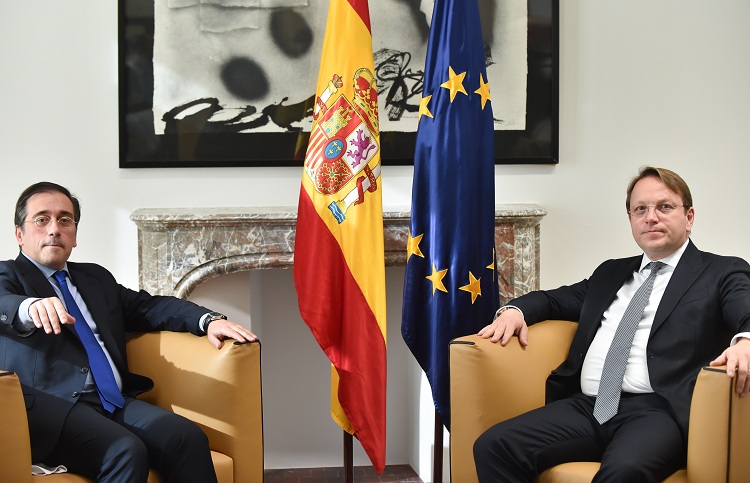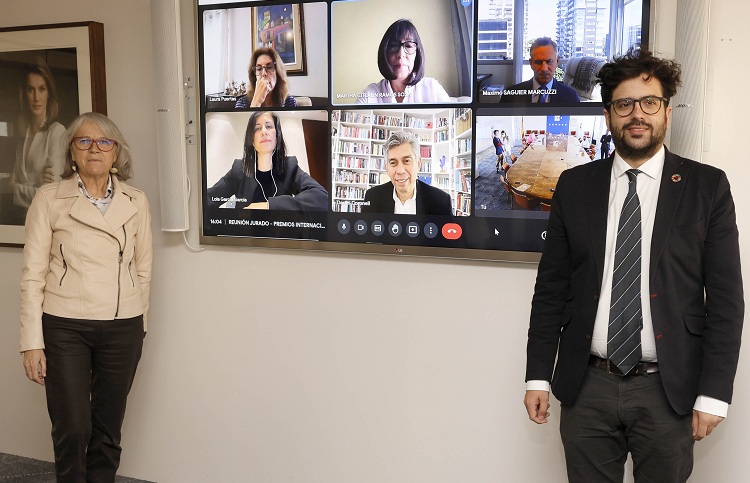Eduardo González
The extraordinary Foreign Affairs Council of the European Union discussed yesterday in Brussels the need to seek alternative energy routes in the medium and long term to reduce dependence on Russian gas, a debate in which the Minister of Foreign Affairs, José Manuel Albares, took the opportunity to recall the long-standing Spanish proposal to invest more in interconnections for gas and green hydrogen.
The Council, devoted entirely to the Russian military aggression against Ukraine, was chaired by the EU High Representative for Foreign Affairs and Security Policy, Josep Borrell, and held informal exchanges with the U.S. Secretary of State, Antony Blinken; Canadian Foreign Minister Mélanie Joly, UK Foreign Secretary Liz Truss, NATO Secretary General Jens Stoltenberg and Ukrainian Foreign Minister Dmytro Kuleba (by videoconference).
During the meeting, as Albares explained at the subsequent press conference, the Temporary Protection Directive was approved, “for the first time in the history of the European Union”, a mechanism “that will allow extending protection to all Ukrainians and residents of that country who enter the EU”. “This is a new historic measure, similar to the SWIFT disconnection of several Russian banks, the introduction of Vladimir Putin and his Foreign Minister Sergei Lavrov on the list of sanctioned persons, or the decision to use the European Peace Fund to send arms to Ukraine,” he added.
Precisely, the EU Justice and Home Affairs Council in Brussels on Thursday approved temporary protection for people fleeing the war in Ukraine. Temporary protection is an emergency mechanism that can be applied in the event of a mass influx of people and aims to provide immediate and collective protection (i.e. without having to consider each application individually) to displaced persons who are not in a position to return to their country of origin. Last Tuesday, the Spanish government committed itself to participate in the plans for temporary protection and equitable distribution among the EU member states.
On the other hand, Albares explained, yesterday’s Council discussed “how to deal with a possible energy crisis and, in the medium and long term, to definitively reduce dependence on Russian gas” by searching for “alternatives” that would allow “Europe not to find itself in this situation again”.
“There are Spanish proposals on the table, such as the idea of investing more in interconnections that are not only for gas, but that can also be used for green hydrogen,” the minister stressed. “For Spain, energy interconnections are a historical claim,” he recalled. “As is well known, our dependence on Russian gas is very small, just under 10%. However, our main suppliers, 50% from Algeria, 20% from the USA and a series of regasification plants in Spain such as do not exist in any other European country, position us very well to be part of this alternative solution that is being designed at the moment,” he said.
According to Albares, no new sanctions against Russia were discussed during yesterday’s meeting. “The message that has been repeated the most”, reiterated by Borrell, is that “at this moment, after seven days in which we have put in place a massive package of sanctions, the important thing is not to seek new sanctions but to apply those that we have decided”, he explained.
“The effort in the coming days has to be in making those sanctions effective at the level of each one of us,” added Albares, who hours earlier had participated in the extraordinary meeting of NATO foreign ministers, held at the Atlantic Alliance headquarters in Brussels to address the escalating crisis in Ukraine, and met in the afternoon with the European Commissioner for Neighborhood and Enlargement, Olivér Várhelyi, to discuss the situation in Ukraine, the EU enlargement process, migration flows and cooperation with the Southern Neighborhood.







